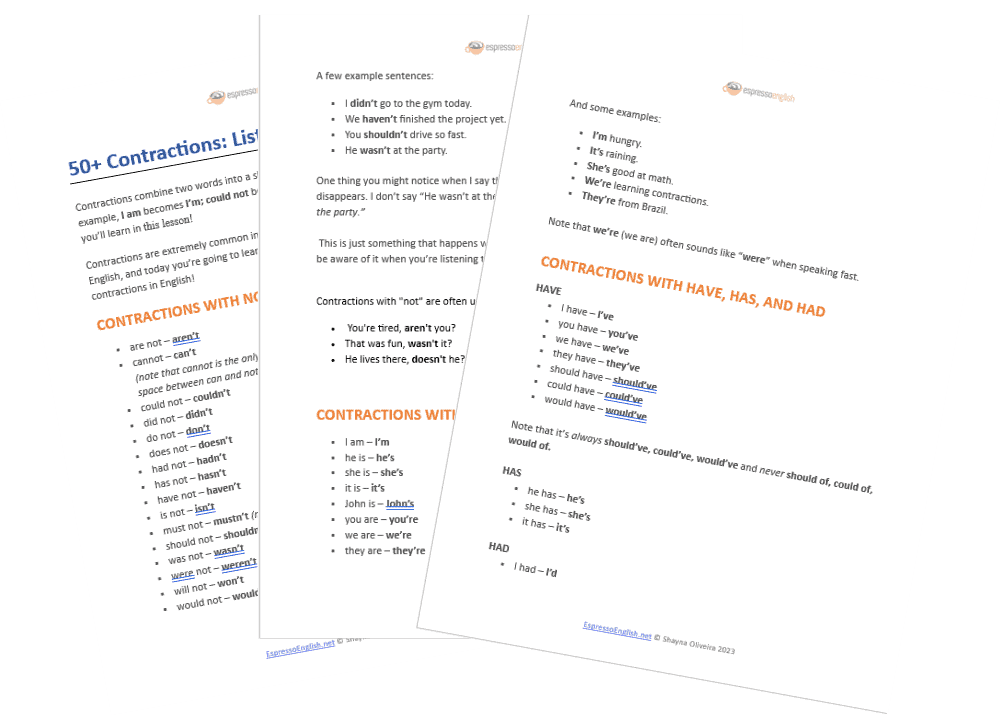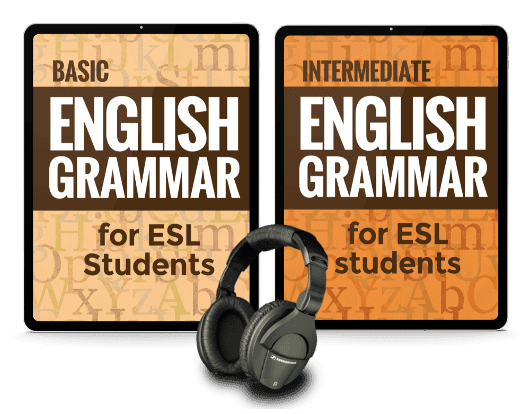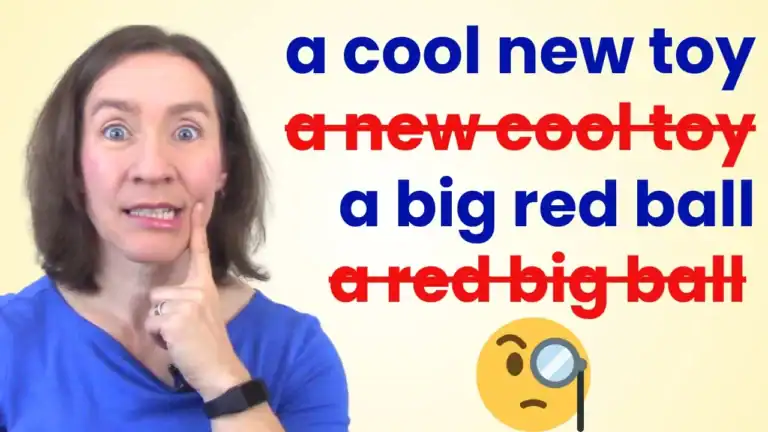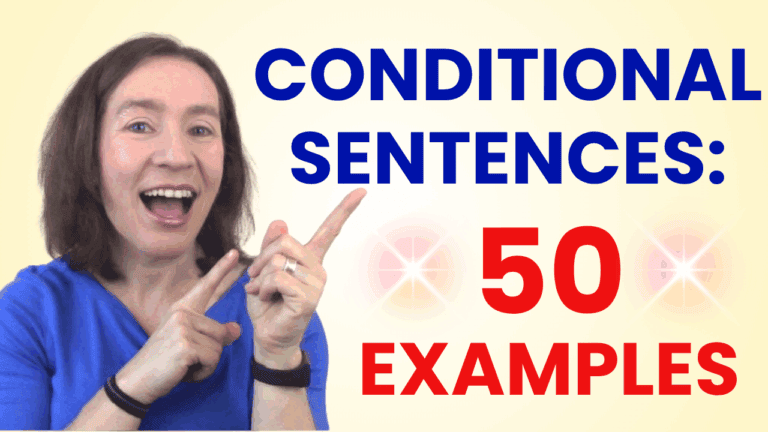
Contractions combine two words into a short form with an apostrophe to replace the missing letter or letters – for example,
- I am becomes I’m
- could not becomes couldn’t
- …and many more that you’ll learn in the contractions list below!
Contractions are extremely common in spoken English and informal written English, and today you’re going to learn 50 of them – yes, we do have that many contractions in the English language!
Make sure to download the free PDF guide to this lesson so you can save the full contractions list and all the example sentences.
Contractions with NOT
- are not – aren’t
- cannot – can’t
(note that cannot is the only one of these that’s a single word, without a space between can and not) - could not – couldn’t
- did not – didn’t
- do not – don’t
- does not – doesn’t
- had not – hadn’t
- has not – hasn’t
- have not – haven’t
- is not – isn’t
- must not – mustn’t (not common in American English)
- should not – shouldn’t
- was not – wasn’t
- were not – weren’t
- will not – won’t
- would not – wouldn’t
A few example sentences:
- I didn’t go to the gym today.
- We haven’t finished the project yet.
- You shouldn’t drive so fast.
- He wasn’t at the party.
One thing you might notice when I say these sentences is that the final “t” almost disappears. I don’t say “He wasn’t at the party,” it sounds more like “He wasn’at the party.” This is just something that happens when speaking naturally, and I want you to be aware of it when you’re listening to native English speakers talking fast.
Contractions with “not” are often used in tag questions:
- You’re tired, aren’t you?
- That was fun, wasn’t it?
- He lives there, doesn’t he?
Contractions with BE (am – is – are)
- I am – I’m
- he is – he’s
- she is – she’s
- it is – it’s
- John is – John’s
- you are – you’re
- we are – we’re
- they are – they’re
Remember: its without an apostrophe is a possessive pronoun, ex. The car crashed because its brakes failed. It’s with an apostrophe is the short form of “it is” or “it has” (which you’ll see in the next section).
And some examples:
- I’m hungry.
- It’s raining.
- She’s good at math.
- We’re learning contractions.
- They’re from Brazil.
One thing to be aware of is that we’re (we are) often sounds like “were” when speaking fast.
Contractions with HAVE, HAS, and HAD:
HAVE
- I have – I’ve
- you have – you’ve
- we have – we’ve
- they have – they’ve
- should have – should’ve
- could have – could’ve
- would have – would’ve
Note that the short forms of these modal verbs are always should’ve, could’ve, would’ve and never should of, could of, would of.
HAS
- he has – he’s
- she has – she’s
- it has – it’s
HAD
- I had – I’d
- you had – you’d
- he had – he’d
- she had – she’d
- we had – we’d
- they had – they’d
We use have/has in the present perfect tense, as in these examples:
- I’ve finished the book.
- You’ve been working hard.
- She’s already eaten dinner.
- He’s been sick all week.
- We’re going to be late – we should’ve left earlier.
We do NOT use the contracted form if “have/has/had” is the MAIN VERB of the sentence, meaning possession. We only use the contraction when have/has/had is acting as a helping verb.
- Main verb: I have a dog. (not “I’ve a dog”)
- Helping verb: I‘ve adopted a dog.
- Main verb: He has an old car.
- Helping verb: He’s been driving that car for 20 years.
- Main verb: We had a good time last night.
- Helping verb: We helped him because we‘d promised to do so.
- Main verb: The pharmacy should have that medicine.
- Helping verb: You should’ve apologized for being rude.
Also, you might notice that she’s could be “she is” or “she has” – how can you know which one?
Look at the whole sentence.
If it’s followed by an -ING verb or by an adjective or noun, that means “she is”:
- She’s preparing a lesson. (She is preparing)
- She’s a teacher. (She is a teacher)
- She’s busy. (She is busy)
If it’s followed by a past participle, that means “she has”:
- She’s told everyone the news. (She has told)
- She’s been planning her vacation. (She has been)
Note: ‘s can also be used in possessive nouns (John’s kids, Mary’s car).
We use contractions with had in the past perfect tense, as in these examples:
- By the time I arrived, he’d already left.
- We’d been thinking about selling our house, but we changed our minds.
- They said they’d gotten a dog.
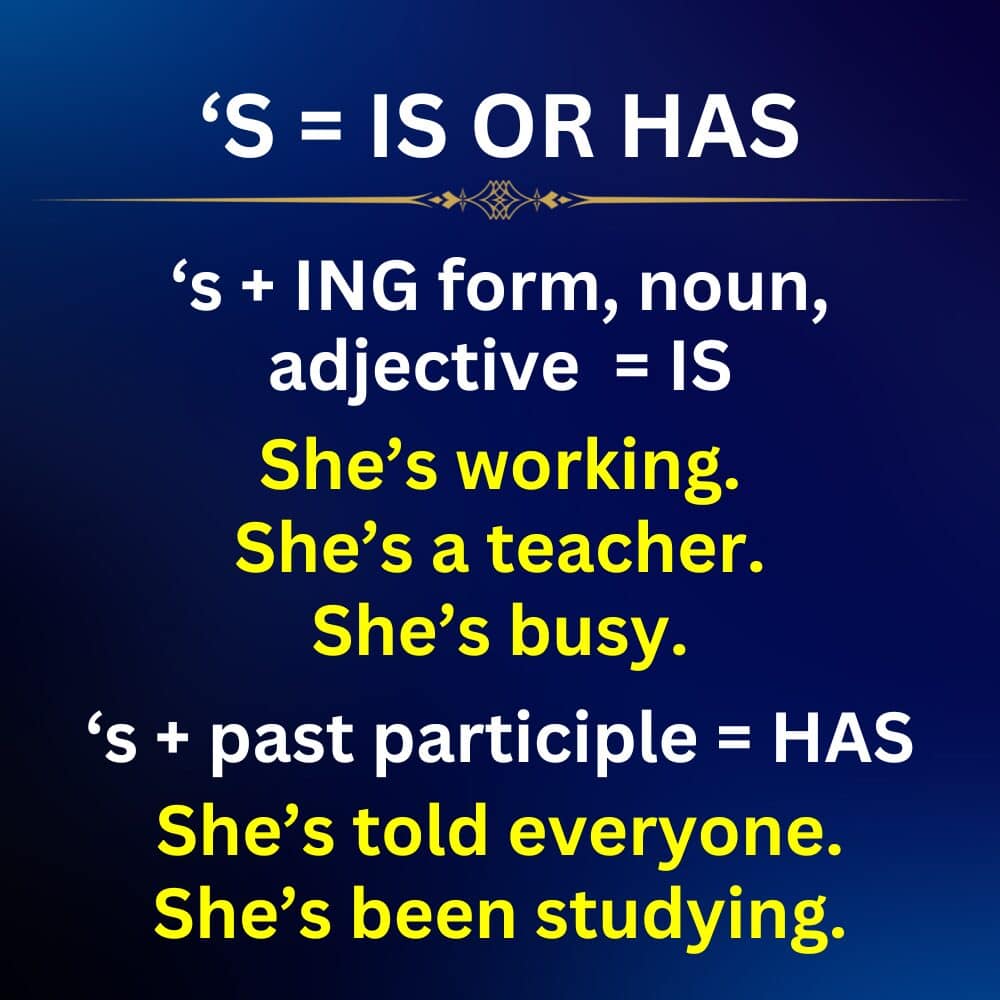
Contractions with WILL
A lot of these sound a bit different when spoken fast, as you’ll see in the example sentences)
- I will – I’ll (often sounds like “all”)
- you will – you’ll
- he will – he’ll (often sounds like “hill”)
- she will – she’ll (often sounds like “shill”)
- it will – it’ll
- we will – we’ll (often sounds like “will”)
- they’ll – they’ll
Let’s look at and listen to the examples:
- I’ll get back to you later.
- I think he’ll like the gift.
- We’ll be traveling next week.
- Talk to Jane – she’ll help you set up your account.
Contractions with WOULD
- I would – I’d
- you would – you’d
- he would – he’d
- she would – she’d
- we would – we’d
- they would – they’d
For example:
- I’d like to see the dessert menu, please.
- If he ate healthier food, he’d feel better.
- When we were kids, we’d go to the beach every summer.
Again, we have a problem – they’d can mean they had or they would – how can you know which one? By looking at what comes after it.
They’d + past participle means “they had,” and they’d + base form means “they would”:
- I wanted to see them, but they’d already left. (they had already left)
- They told the host they’d leave early. (they would leave)
- He was disappointed because he’d gotten a bad grade on the test. (he had gotten)
- If he studied more, he’d get better grades. (he would get)
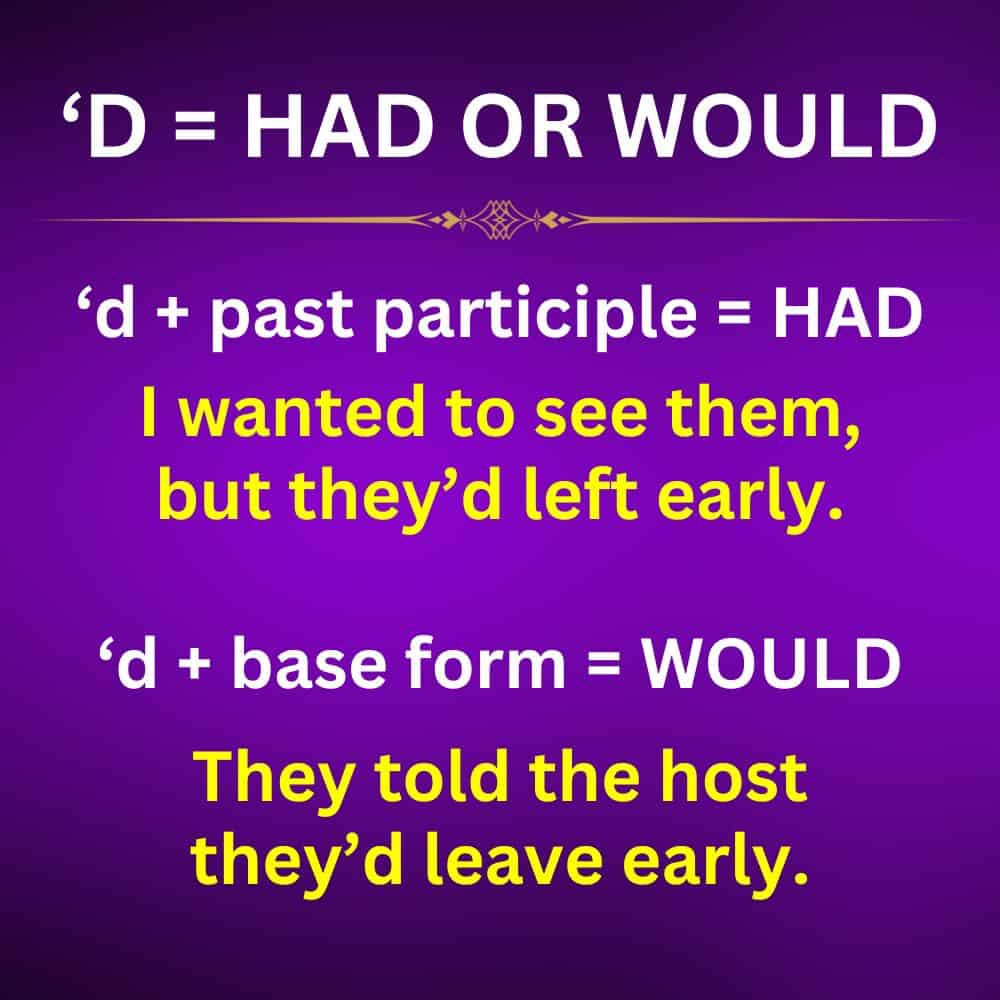
Contractions with other words
We’ve been focusing on contractions with subjects that are people – I, you, he, she, etc. but we also have some common contractions with other words – so let’s finish this lesson by looking at some of those.
Here is and there is become here’s and there’s. For example:
- Here’s the book you asked for.
- There’s no more milk in the fridge.
We do not make contractions in writing with here are and there are, even though they might sound shorter when speaking. But in writing, they are always two words:
- Here are the magazines you asked for.
- There are no more eggs in the fridge.
That is becomes that’s, and that would becomes that’d:
- You got promoted? That’s great!
- If you can pick up some groceries on your way home from work, that’d be helpful.
(note that when speaking, that’d almost sounds like “thad”)
This will and that will become this’ll and that’ll:
- This’ll be the first time my son travels by himself.
- She wants to make all the decorations by hand, but I think that’ll take too long.
We also see a lot of contractions with question words:
- What is/has – what’s
- What’s your name?
- What’s he been doing lately?
- Where is – where’s
- Where’s the nearest gas station?
- Where did – where’d
- Where’d you go last night?
- When is – when’s
- When’s your birthday?
- When’s a good time for a meeting?
- Who is/has – who’s
- Who’s the best student in the class?
- How is/has – how’s
- How’s your family?
- How’s everything been at work?
- How did/would – how’d
- How’d you finish your homework so fast?
- How’d you like to go out for dinner?
- Why is/has – why’s
- Why’s the TV on if nobody’s watching?
- Why did – why’d
- Why’d he leave work early?
- Let us – let’s
- Let’s learn all about English grammar!
When to use and when NOT to use contractions
When we’re speaking English, we use contractions very often – pretty much anytime there’s an opportunity to use one, we use it in everyday speech. Otherwise, your speaking would sound kind of strange and robotic – plus it takes longer. Compare these:
- I would love to help tomorrow, but there is a good reason I cannot – my car is not working, so I will be taking it to the mechanic.
- I’d love to help tomorrow, but there’s a good reason I can’t – my car’s not working, so I’ll be taking it to the mechanic.
We avoid contractions in formal writing – so that would be business letters and reports, contracts, academic essays and research papers. Check out this lesson about transforming more casual phrases into more formal phrases for business English.
We can use contractions in informal writing – casual emails, blog posts, social media posts/comments, text messages, etc.
What about e-mails at work – are those considered formal or informal?
It depends – contractions are fine in e-mails to people who you regularly communicate with, like your co-workers, supervisors or employees, clients with whom you already have a relationship, etc.
But you should avoid contractions if it’s the very first time you’re contacting someone, such as in an e-mailed cover letter inquiring about a job you want, or when you’re reaching out to a brand new client or someone at another company when you’re beginning a business relationship with them. In those situations we tend to write a little more formally, and then the communication style becomes more casual over time as more messages get exchanged.
Learn more: English phrases for business letters and e-mails
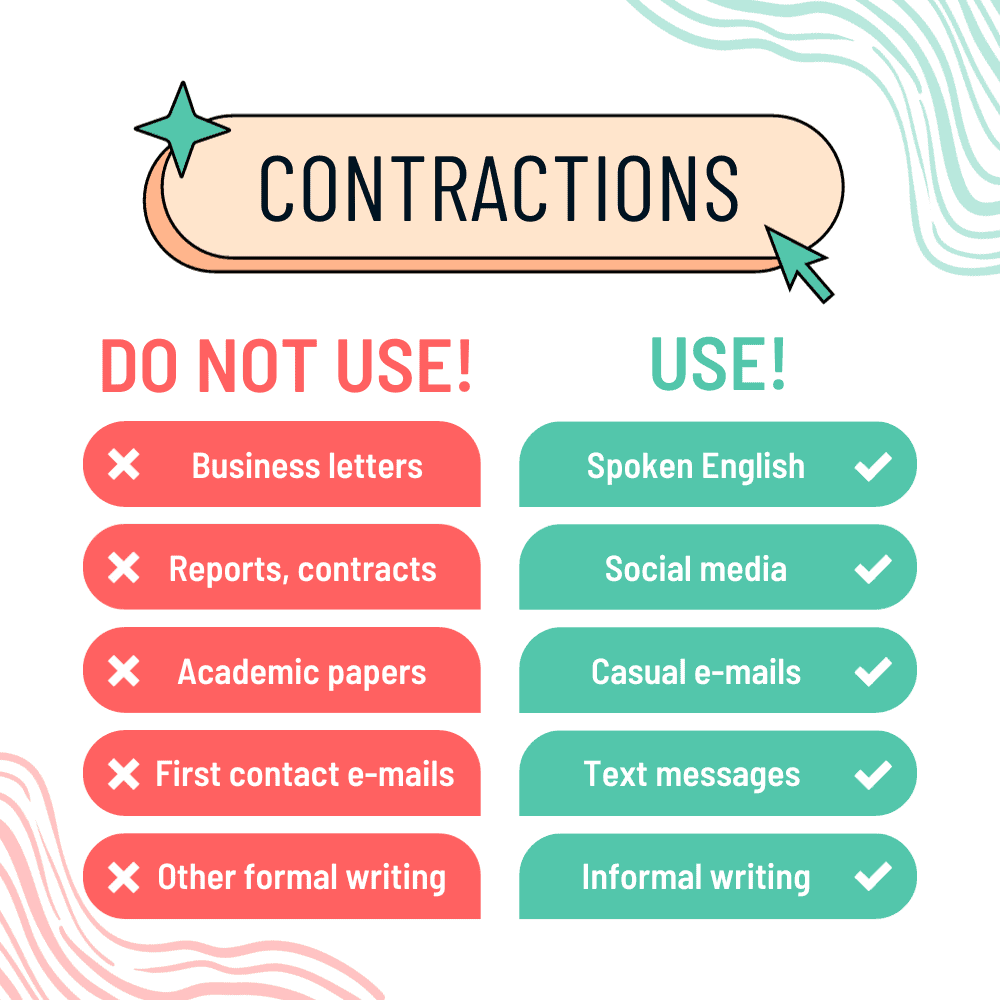
Contractions list & contractions worksheets
Now you know all about contractions in the English language, and you’ve seen lots of examples!
Here are some contractions worksheets and activities to help you practice.


